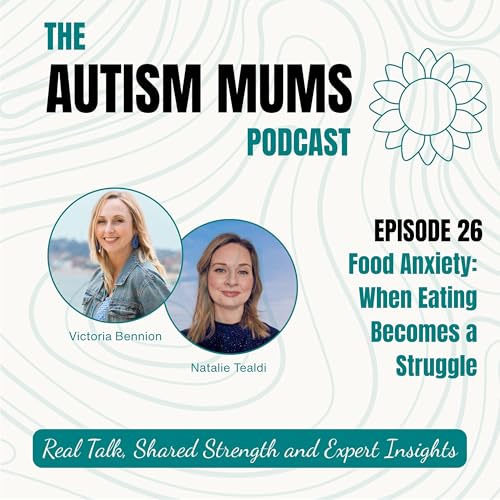
Food Anxiety: When Eating Becomes a Struggle
Échec de l'ajout au panier.
Échec de l'ajout à la liste d'envies.
Échec de la suppression de la liste d’envies.
Échec du suivi du balado
Ne plus suivre le balado a échoué
-
Narrateur(s):
-
Auteur(s):
À propos de cet audio
In this week’s episode of The Autism Mums Podcast, we talk openly about what happens when eating stops feeling simple and starts feeling scary. We unpack ARFID (Avoidant/Restrictive Food Intake Disorder) and explore how it differs from 'picky eating, sharing our real-life experiences.
Key Takeaways- Identical packaging and familiar brands can build trust.
- Safe foods can be very limited, for some children under 10 items
- When anxiety spikes with transitions like back-to-school often shrink food choices.
- “They’ll eat if they’re hungry” advice can escalate fear and refusal.
- Texture, temperature, smell, colour and broken food can be deal-breakers.
- We've found reintroducing once-safe foods during calm periods and follow the child’s curiosity can sometimes be successful
Mentioned in This Episode
BEAT Eating Disorders
ARFID Awareness UK
National Autistic Society
Connect with The Autism MumsWebsite – https://theautismmums.com/
Follow us on Instagram https://www.instagram.com/theautismmums
Follow us on TikTok https://www.tiktok.com/@theautismmums
Follow us on Facebook https://www.facebook.com/theautismmums
Victoria Bennion:
Hello and welcome back to the Autism Moms podcast. Today we're talking about
something that many families quietly battle with every day. When eating stops
feeling simple and starts feeling scary. You'll hear us mention ARFID quite a
lot.
Natalie Tealdi: ARFID
is avoidant restrictive food intake disorder, which is more commonly known as
ARFID. It's a condition characterized by , the person avoiding certain foods or
types of foods having restricted intake in terms of overall amount eaten or
both?
Any anyone of any age can have a i. It occurs in children,
teenagers, and adults. Although people with ARFID may lose weight or have low
weight, this is not a criteria for ARFID. It can occur at any weight and varies
in different people.
Victoria Bennion: If
you are wondering, is this just picky eating? We'll talk about a few signposts
that could indicate it may be more. We'll share our family's [00:01:00] experiences and the ways we found to
support our children. As always, we are here to share our own experiences in
the hope that they may be useful.
Not to diagnose. If anything you hear raises concerns, do speak
with your GP or a qualified clinician.
Natalie Tealdi: So
Victoria, I think you have the best knowledge out of both of us on this one. Do
you wanna talk a bit about your
experiences?
Victoria Bennion:
Yeah. I can talk about our experiences. So my son doesn't have a diagnosis of a
ARFID, but in his autism diagnosis, he's noted as having ARFID behaviors. This
was explained to me as the reason was there very strict criteria that a child
had to meet to


